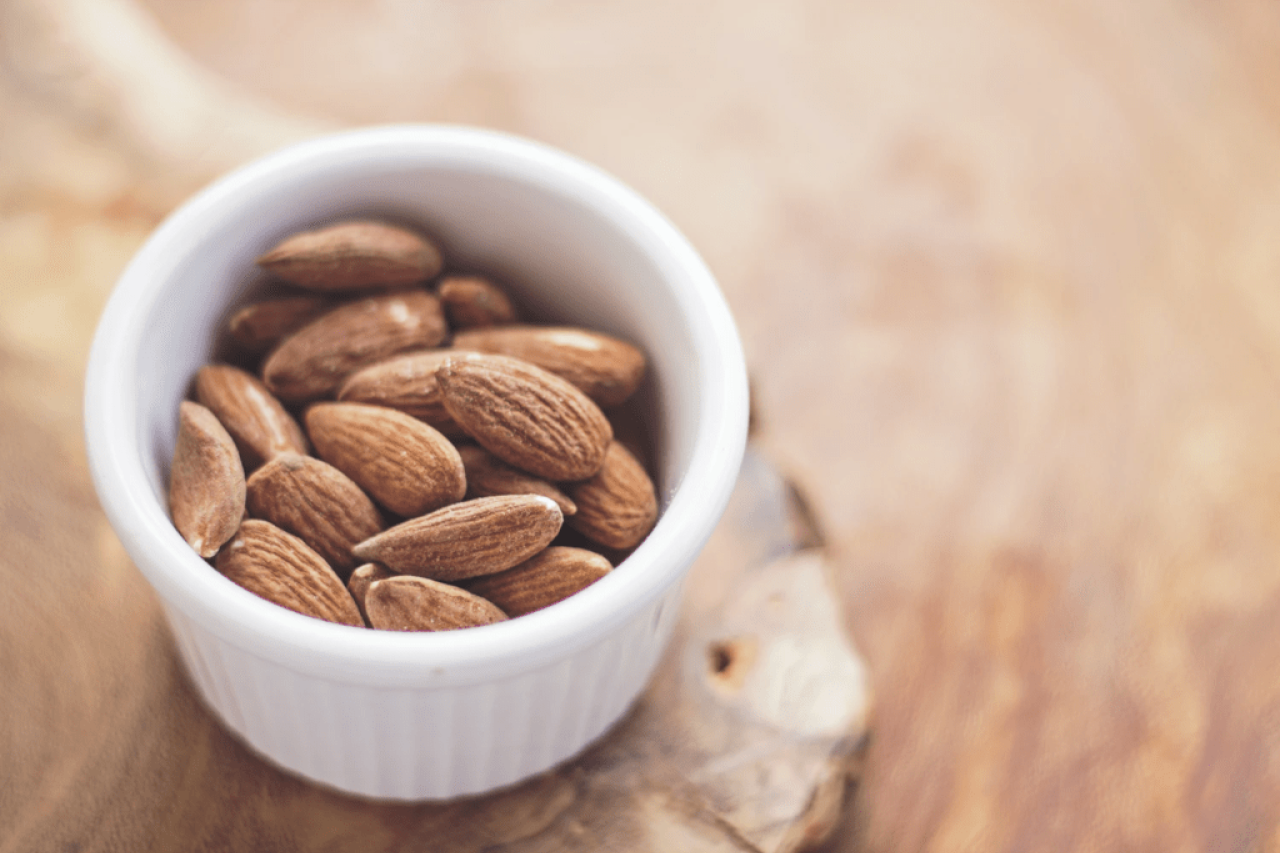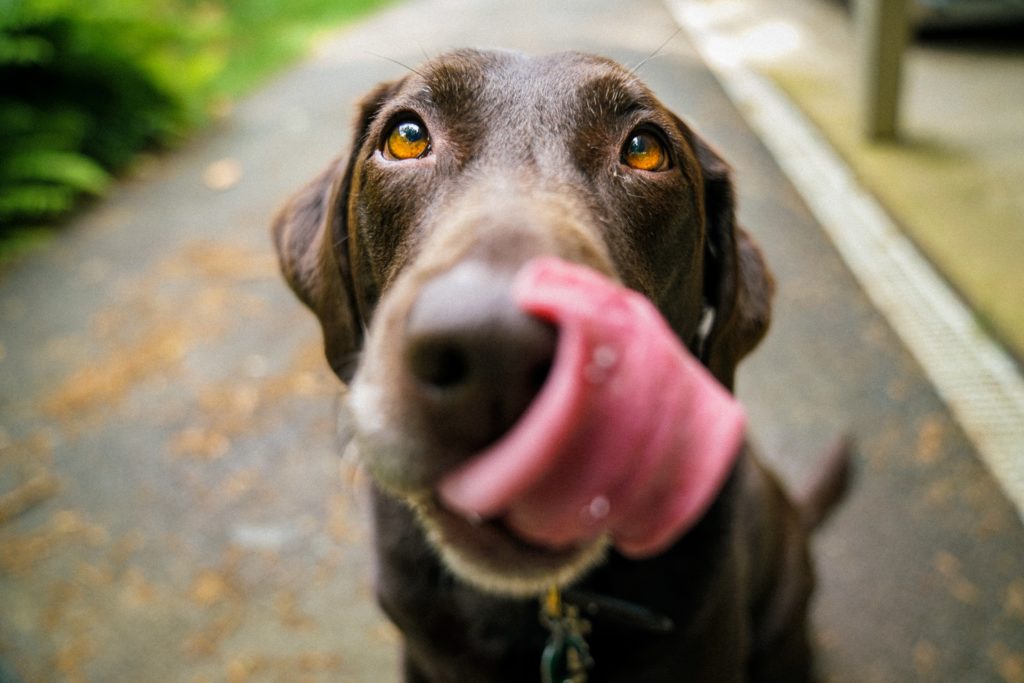
Can Dogs Eat Almonds? Are Almonds Bad for Dogs?
With almond milk and almond butter rising in popularity as a human food wellness trend, it makes dog parents wonder if almond products can be shared with their furry family members.
Like pistachios, almonds are not toxic to dogs, but veterinarians recommend keeping your dog away from them and sticking to regular dog food and treats. Almonds are not as dangerous as pecans, walnuts, or macadamia nuts, which should absolutely be avoided.
Though almonds are nontoxic in small quantities, there are more risks to feeding your dog almonds than there are benefits.
Read on to learn all about the potential dangers almonds pose to your pet.
Why You Should Not Feed Your Dog Almonds

Almonds have an incredibly high-fat content. The fat content from almonds and other nuts can wreak havoc on your dog's digestive system and cause gastric intestinal distress.
In addition to such stomach upset, another reason to not share almonds or almond products with your dog is that they can be high in salt and other seasonings — even highly dangerous artificial sweeteners like xylitol. Heavily salted foods like almonds come with side effects that affect water retention and increase the likelihood of kidney failure.
According to WebMD, too much salt is dangerous for dogs and can also lead to vomiting, diarrhea, lethargy, tremors, and excessive thirst. If your dog ingests too much sodium from salted nuts, your dog could develop a dangerous case of sodium ion poisoning as well.
Foods high in fat like almonds and pistachios are known to cause upset stomach and pancreatitis (inflammation of the pancreas) in dogs when ingested in large quantities. Pancreatitis is a serious condition that needs to be brought to your veterinarian's attention. Signs of pancreatitis in dogs include vomiting, diarrhea, loss of appetite, and lethargy. Pancreatitis flare-ups are most often caused by foods high in fat, just like almonds.
Almonds can also present a choking hazard as well as intestinal obstruction. As a dog parent, you do not want to run the risk of getting a nut stuck in their windpipe.
What To Do If Your Dog Eats Almonds
If your dog only ate a couple of almonds and there are no signs of obstruction or choking, then the worst that can likely happen is that they get a little gassy or have diarrhea the next time you take them on a walk. Your dog might even throw up if those few almonds aren't sitting well in their stomach. Keep an eye on them.
If you suspect your dog ingested a larger amount of almonds, however, talk to your veterinarian as soon as you can. Should your vet not be not immediately available, call the ASPCA Animal Poison Control Center (APCC). This is one of your best resources for any animal poison-related emergency, 24 hours a day, 365 days a year.
Other Dangerous Nuts to Avoid
As mentioned above, there are other kinds of nuts you should avoid feeding your dog. For example, never let your dog have macadamia nuts. The Pet Poison Helpline warns that macadamia nuts cause nerve and muscle damage in addition to severe lethargy, increased body temperature, vomiting, muscle tremors, joint stiffness, and inability to walk.
Pecans and black walnuts are also no-nos. They contain a toxin called juglone, which causes more severe gastrointestinal distress and abdominal pain in dogs. So if you think your pet may have ingested a potentially poisonous substance, like a very large amount of the aforementioned fatty nuts, call the APCC at (888) 426-4435.
Safe Alternatives to Almonds For Dogs

It’s tempting to feed almonds to your pup because they have antioxidants to protect against oxidative stress, vitamin E for lowering risk of heart disease, magnesium to help lower blood pressure, and protein. But the dangers almonds pose to your dog outweigh these health benefits. Besides, almonds are not the only source of such nutrients.
Almonds should never be a regular part of your dog's diet, but there are safe alternatives to almonds you can give to your dog that contain the same nutritional benefits. Plain, unsalted peanut butter, for instance, is a versatile treat high in protein that can be served in a Kong for a long-lasting snack, or used to conceal your dog's medication. Just make sure the peanut butter you use does not have any added salt, seasoning, or xylitol.
Nuts like almonds are filled with heart-healthy omega–3 fatty acids as well, which is great for your dog’s joints, skin, and coat, but there are other foods rich in omega–3 fatty acids that are much safer for your dog to eat. Try Wild Earth Dog Treats!
Make sure to read the feeding instructions on the product so you don’t give them too much. Overdoing it with fish oil can bring about gastrointestinal upset.
As with any food in a dog's diet, moderation is very important. Even peanut butter is calorie-dense and should not be overused. In addition to your dog’s daily meal intake, don’t forget to be conservative when it comes to how many treats you are giving them. According to WebMD, dog treats should make up 5-10% or less of your dog’s daily diet. Whether your dog will get treats throughout the day or you share other human food with them, everything adds up.
Nutrition For Your Dog Is Important
The number 1 thing we can do for our dogs is giving them a food that enables their body and mind to flourish.
Much like us, the healthier your dog’s lifestyle, the more likely they’ll be able to fight off any disease or infection. Often the food we feed our dogs is not doing them justice. It’s filled with artificial flavors, low-quality protein sources, and not enough fiber.
Wild Earth is a Vet-developed food that is a high protein, high fiber source of complete nutrition. Our food is full of beta-glucans, a powerful digestive fiber that helps to fight off disease and increase immunity. It also contains superfoods like chickpeas, sweet potato, oats, and blueberries so your dog can thrive!
So, Are Almonds Bad for Dogs?
The short answer is no, almonds aren’t bad for dogs. But even though they aren’t toxic in small quantities, it’s the safer decision to leave almonds out of your dog's regular diet.
The high-fat content in these nuts puts your dog at risk for pancreatitis and gastrointestinal upset. Feeding them to your dog is not worth the potential consequences to their heath.
Ultimately there are safer and healthier treats than almonds out there that your dog can eat. Remember that your dog can get the same kind of nutrients almonds to offer from safer sources like plain peanut butter in addition to their regular meals. At the end of the day, it is better to play it safe and to keep this particular human food to yourself rather than sharing it with your pooch.
Vitamins Supplements for Dogs
Why do dogs need supplements? Age, environment, pollutants, and the stressors of daily life can all lead to less than optimal health for your dog. We’ve created a family of supplements to provide support in the areas your dog needs it most. Learn about Wild Earth's Dog Supplements!



























